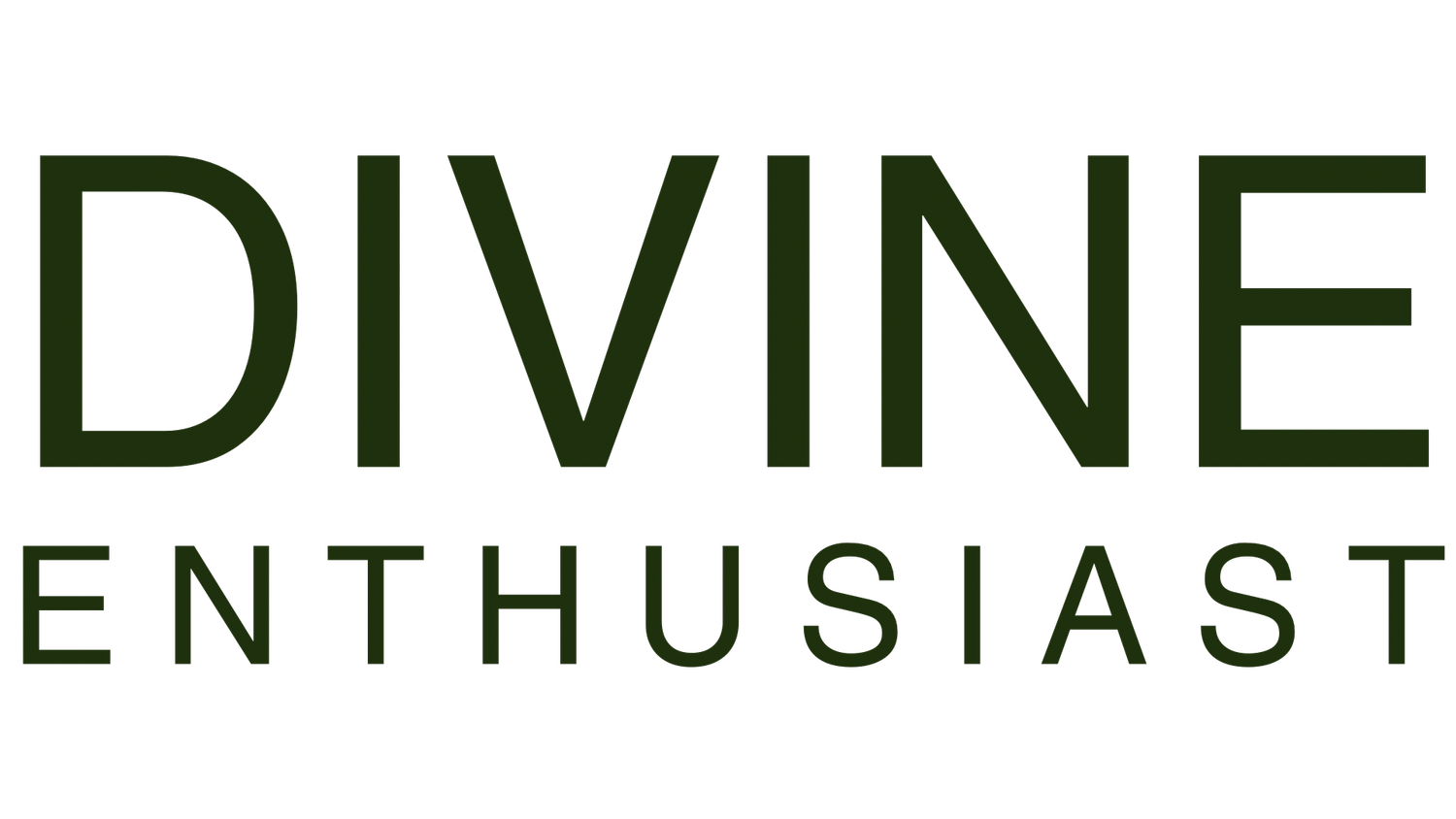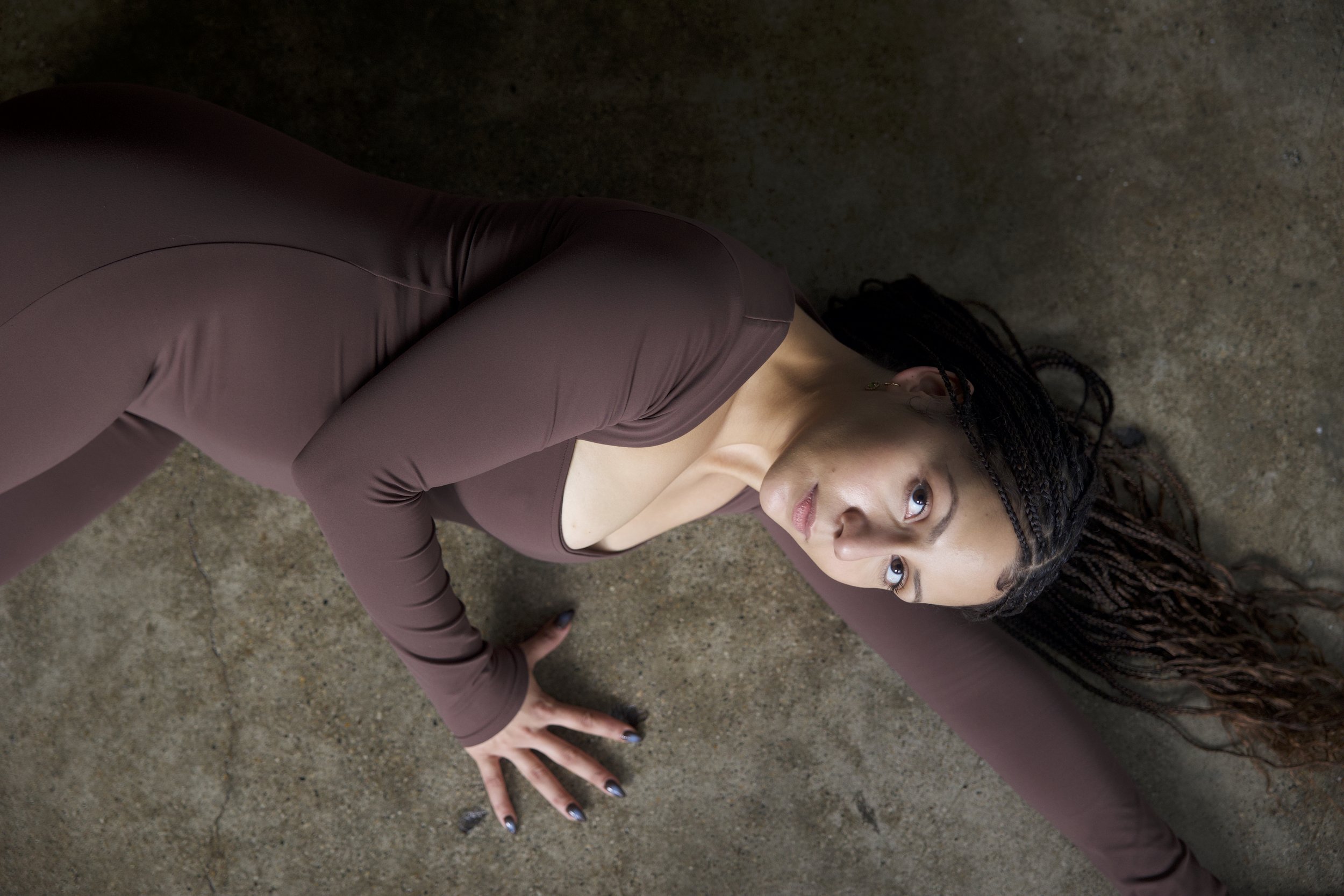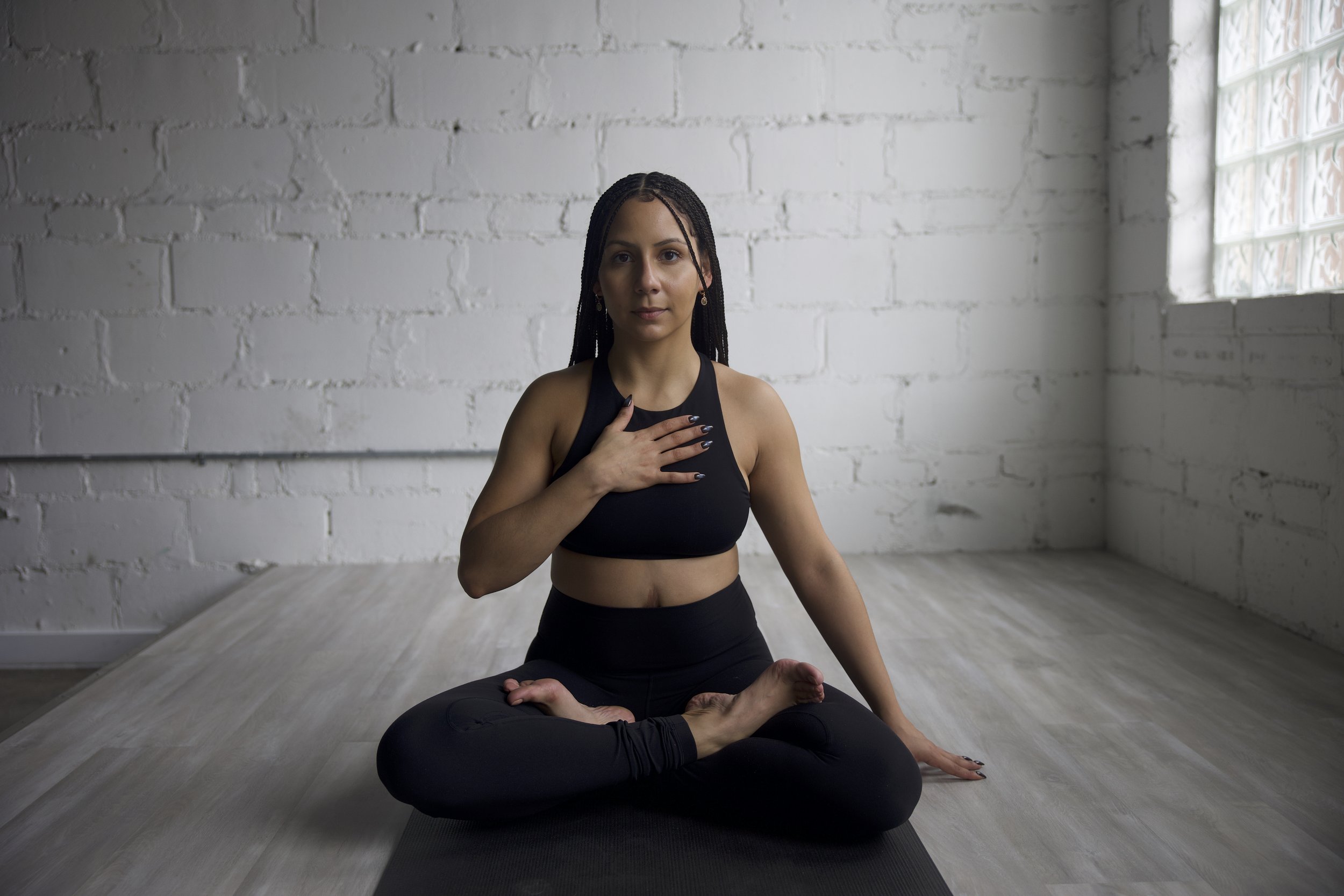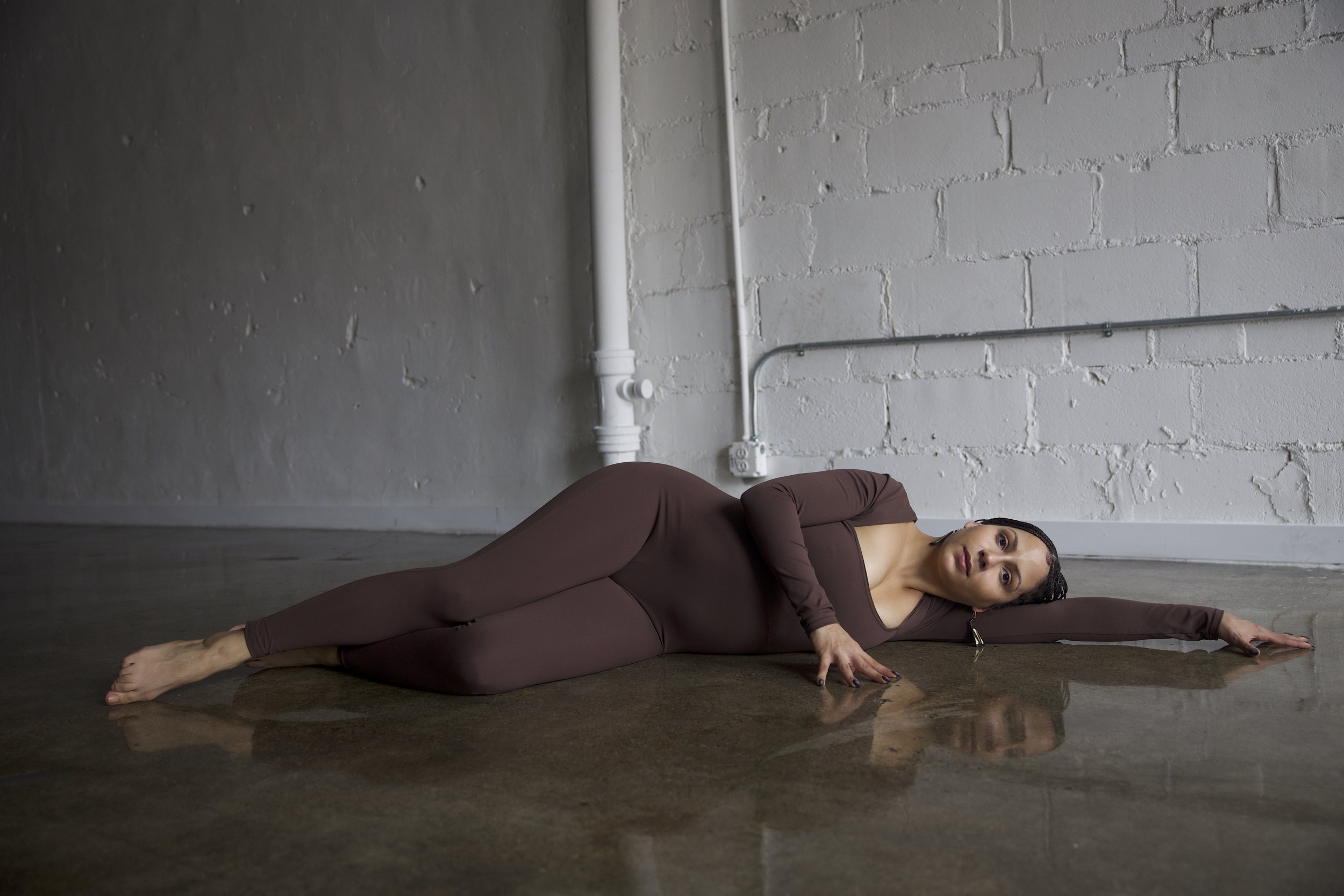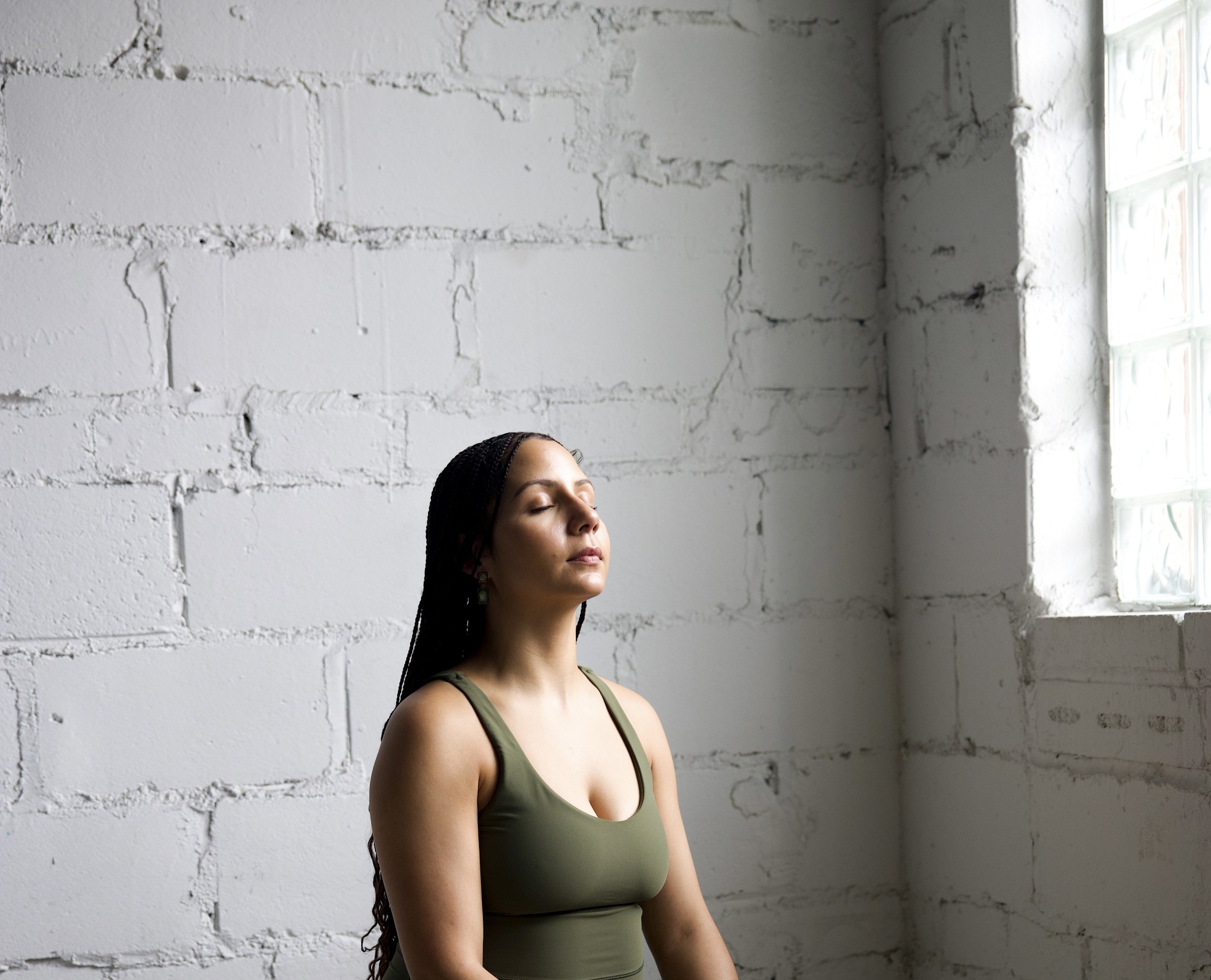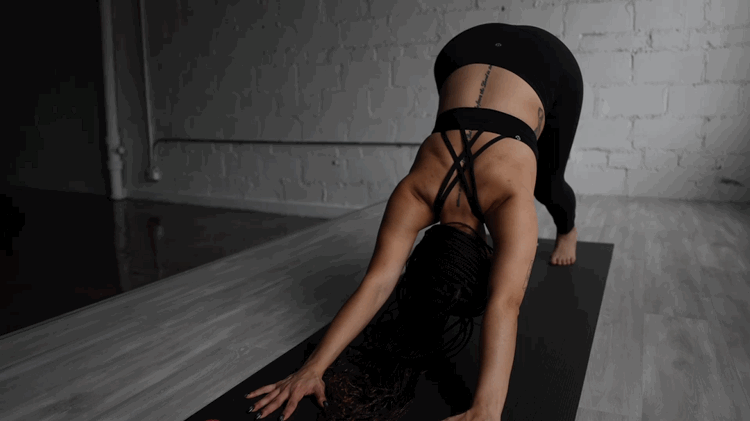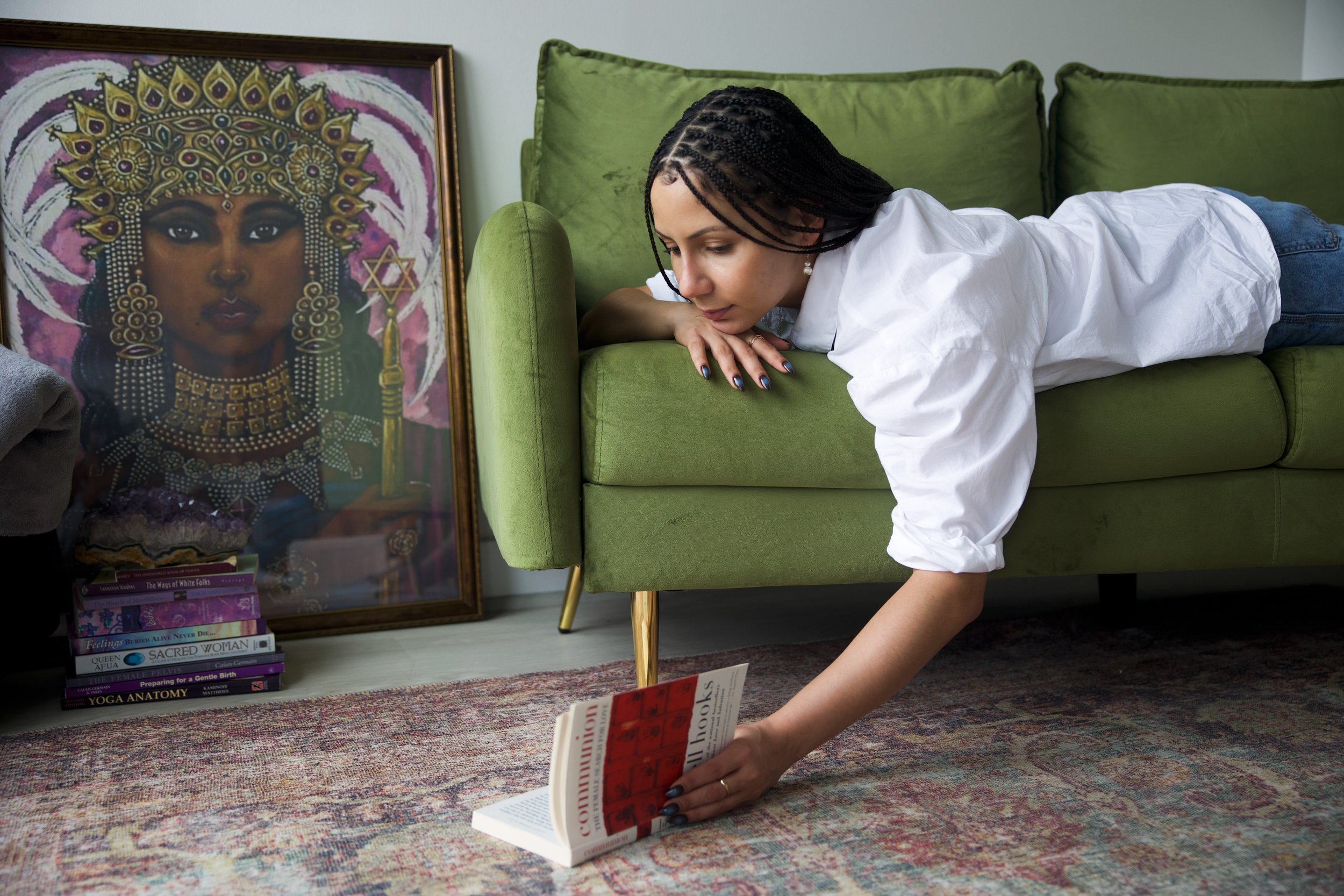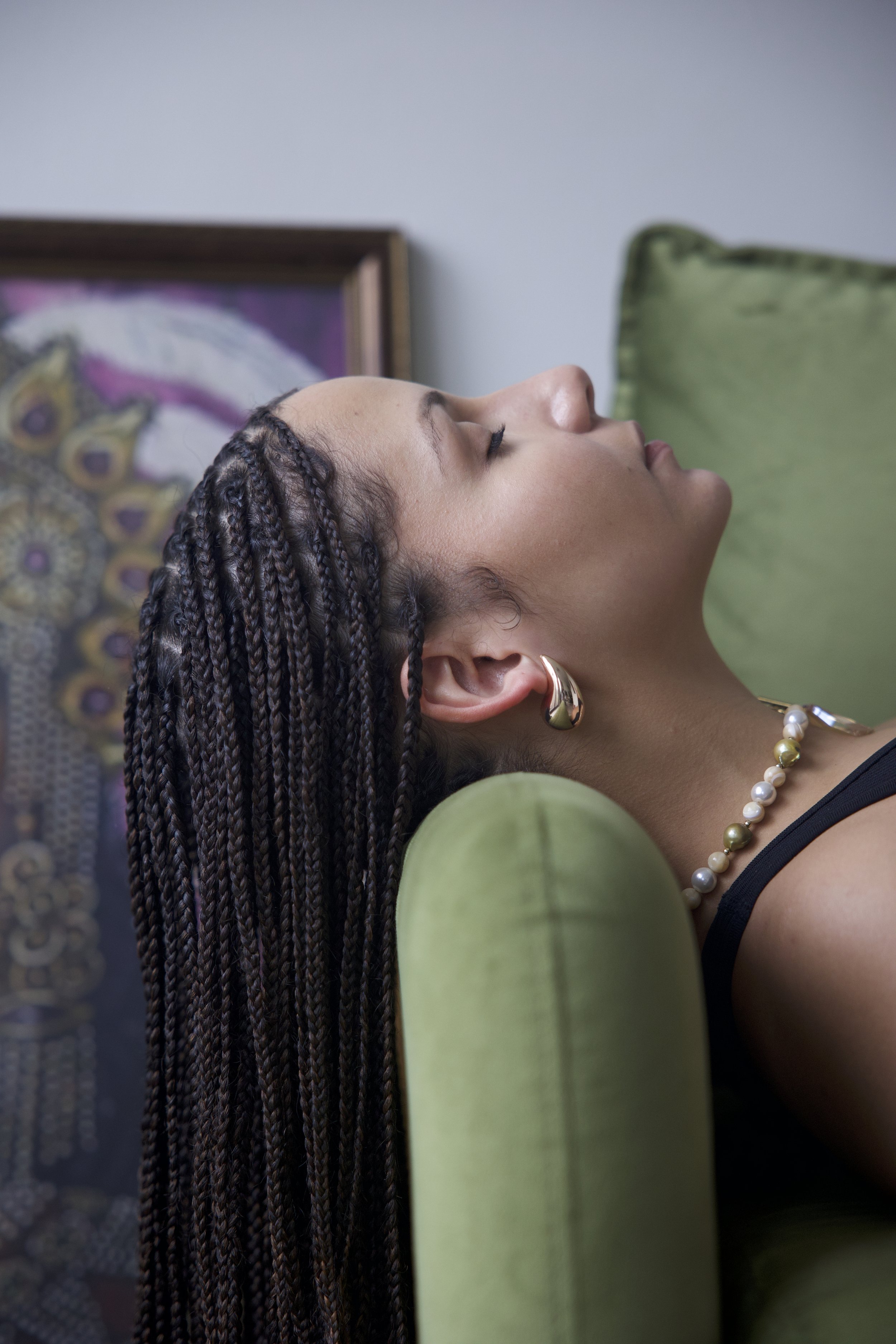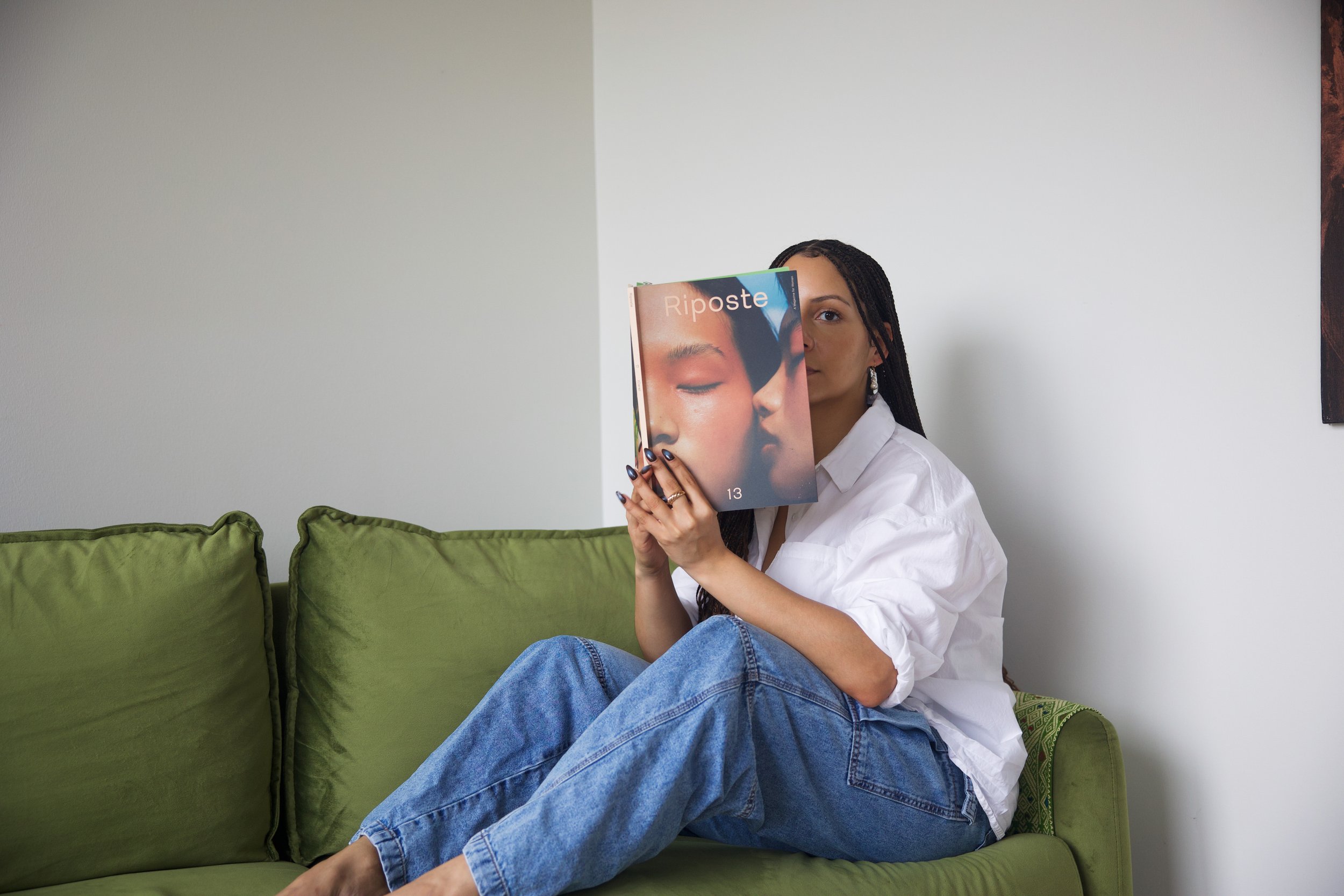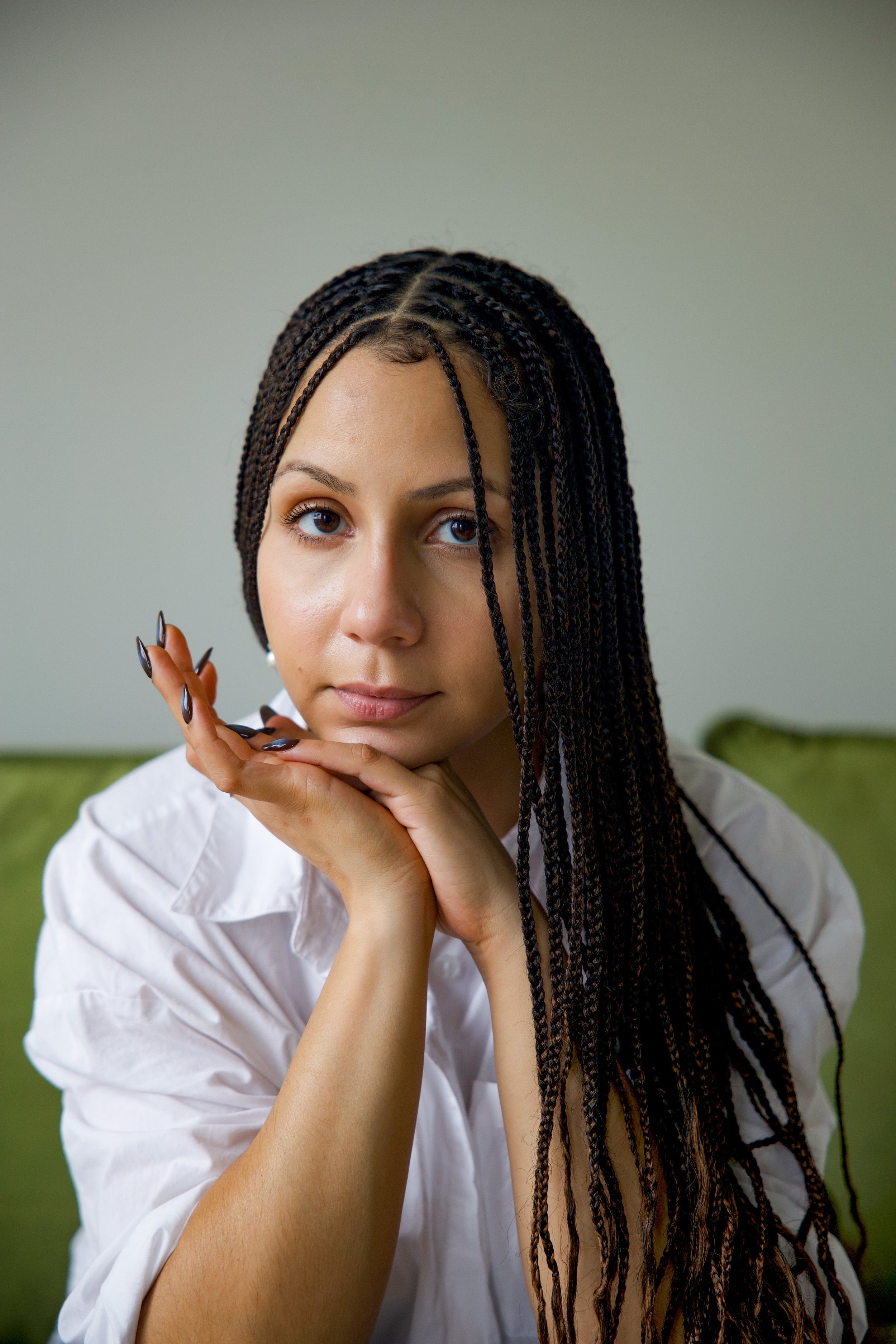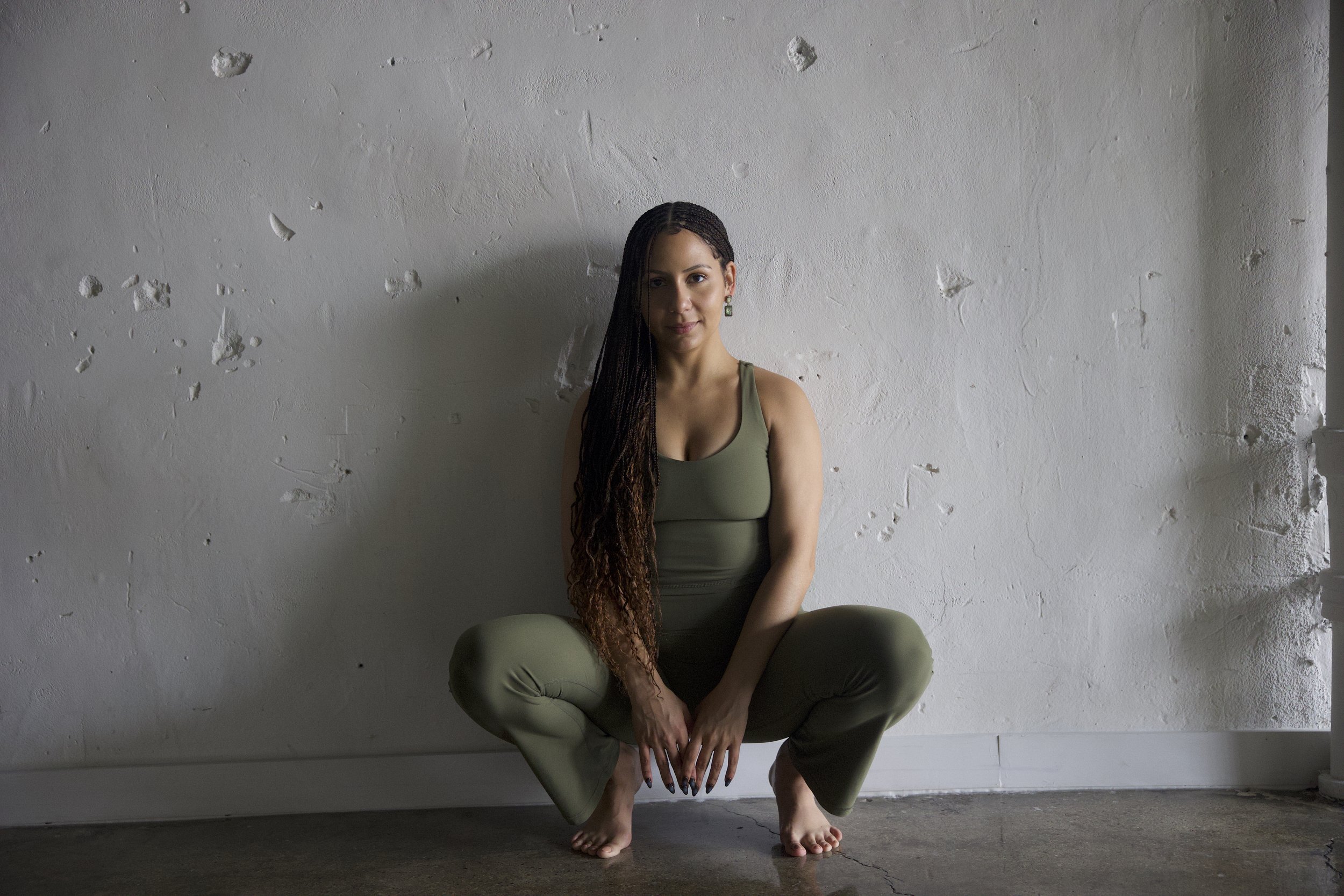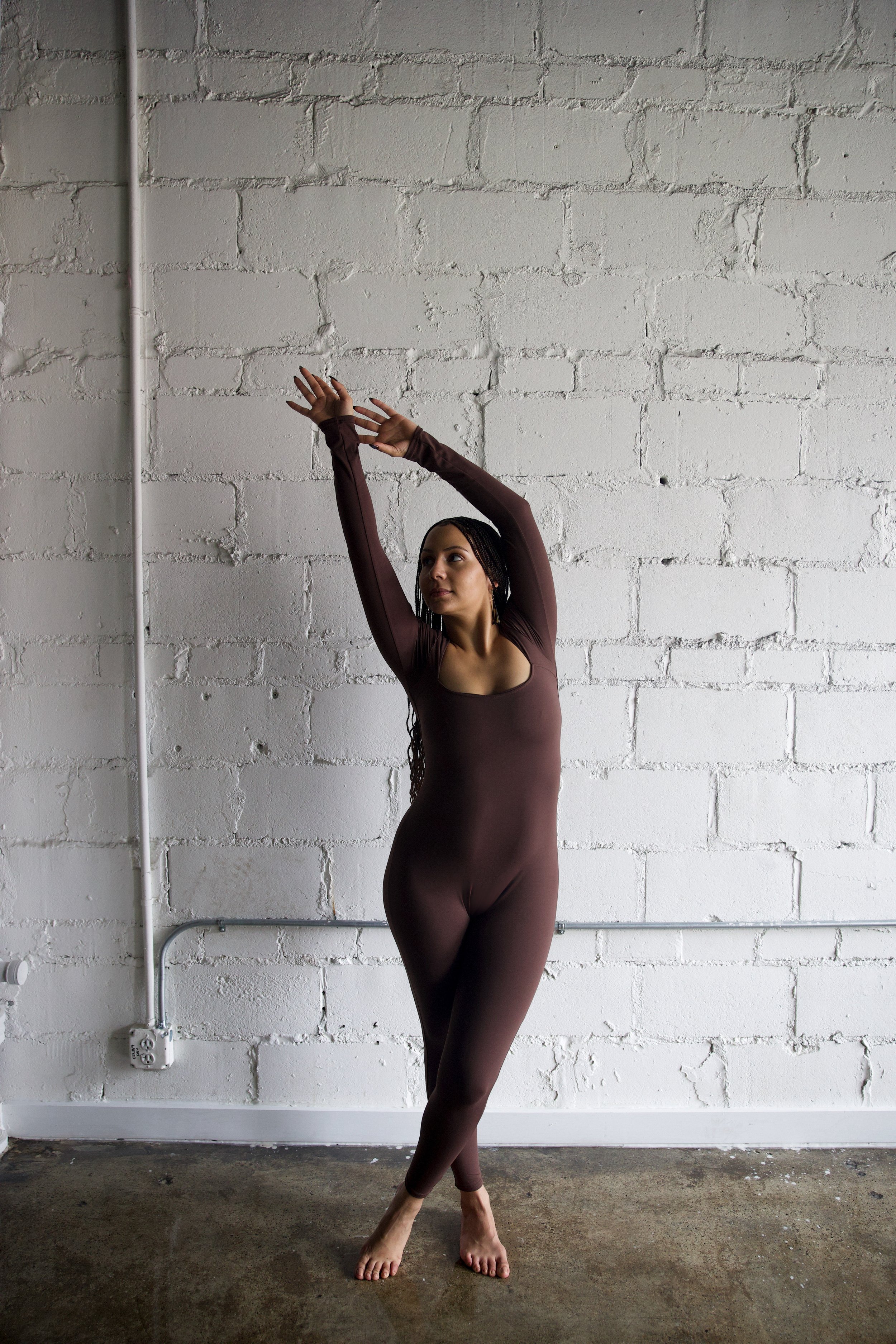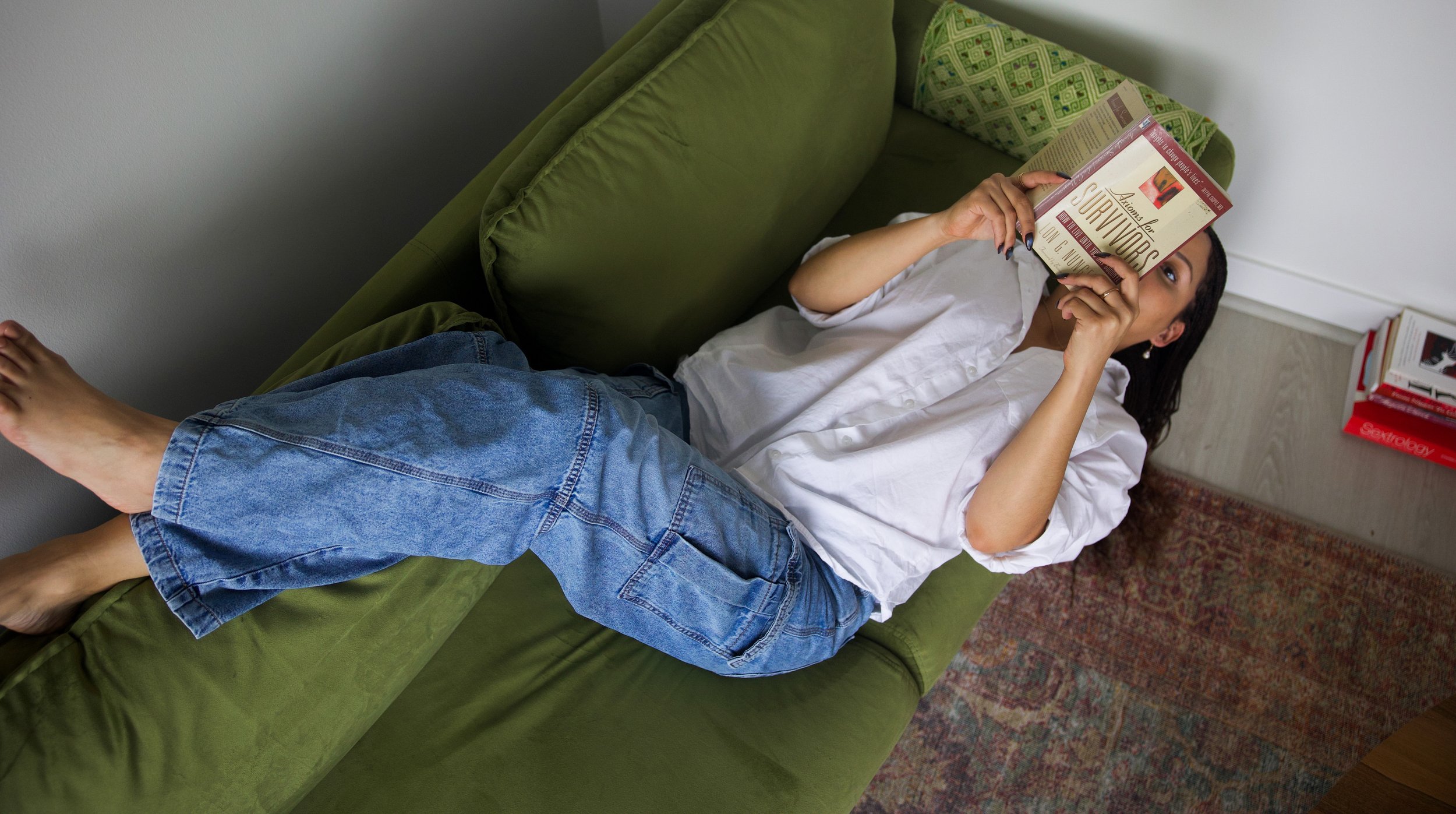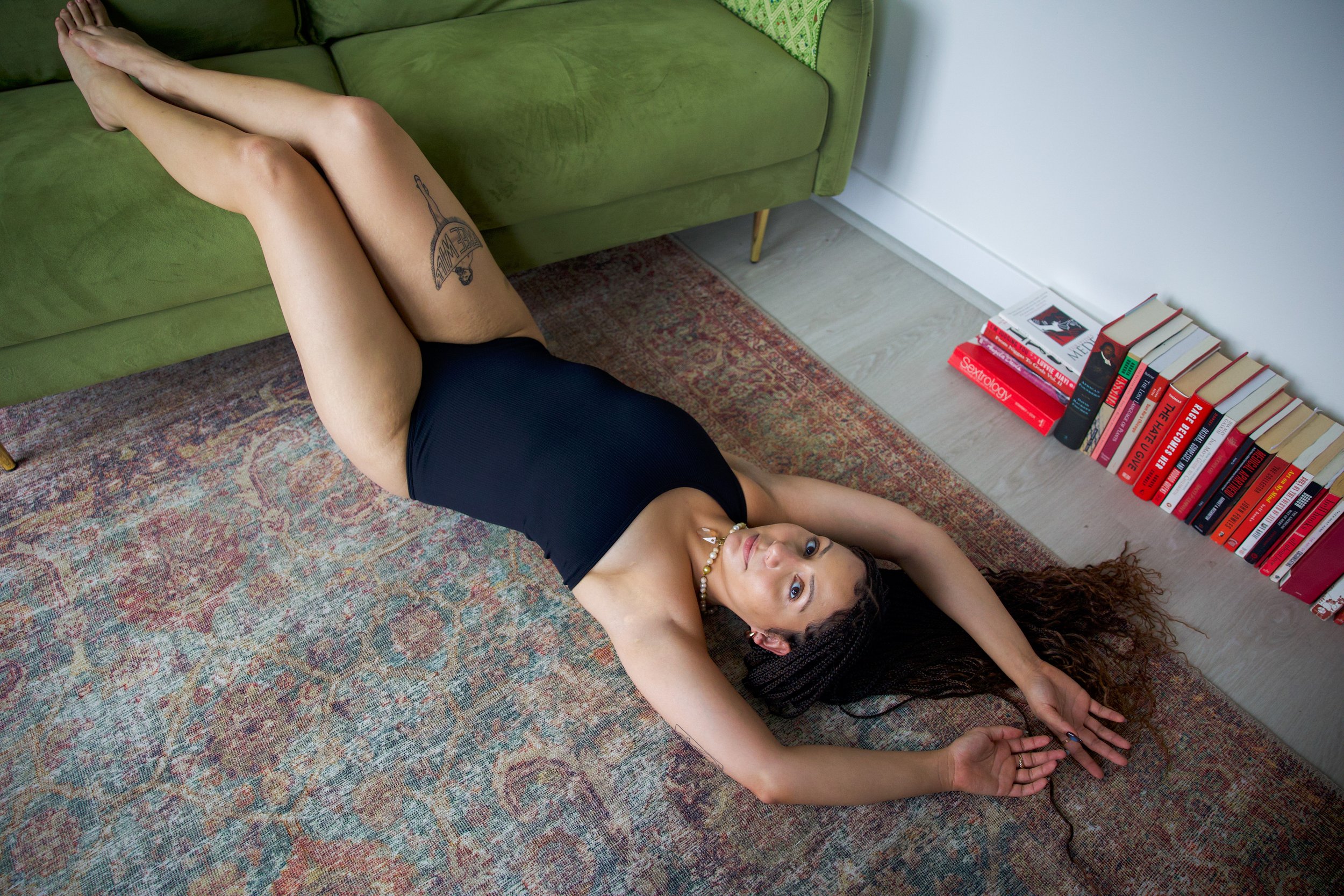The Model of Embodiment: Adria Moses
Interviewed By Natalie Milhouse | Introspect By Adria Moses
Take Care: A Conversation on the Radical Embodiment of Self-Preservation
In a world that often neglects the importance of proper care and community, Adria Moses emerges as a guiding light, placing significance on preserving what matters most - people. As a figure in the practice of radical healing and self-preservation, Adria's familiarity stems from her own lived experiences, navigating the complexities of somatic disruption and trauma since age 12 when she was first diagnosed with Crohn's disease. Though life-threatening challenges, addictions, and mood disorders would shake her to her core, it would prove to deepen her gratitude for breath, sparking a newfound exploration of the mind and body connection.
Her curiosity led her to yoga, where she would fully immerse herself in the practice, proceeding as a RYT-200 Yoga Instructor. She would also earn a certificate as a Trauma-Informed Teacher through the Connection Coalition, which would enable her to launch The School of Radical Healing (SORH). In this transformative space, BIPOC individuals from around the world can equip themselves with the knowledge and tools necessary for self-regulation and trauma recovery. Her thirst for understanding the intricacies of the human body and its responses to trauma continues to allow her to create and cultivate safe environments, as seen through her practices as a doula, 1:1 coach, keynote speaker at companies and universities like LinkedIn and CUNY, pilates instructor, and being an overall voice of empowerment on social media.
Over the years, Adria and I have engaged in countless conversations about life, love, healing, and movement. Take Care, The Radical Embodiment of Self-Preservation reflects one of many dialogues that initially stemmed from a curiosity about self-care perceptions and the need to remember the parts that aren't seen yet still incorporate the body. But what is made clear is that the importance of care in all its forms cannot be overstated, especially in times as unhinged as these. Taking care is not just an act of self-care; it's a radical choice that acknowledges the interdependence of our well-being and recognizes that our care practices have the ability to create revolutionary change in ourselves and the environments we consume. Taking care emphasizes the importance of nurturing oneself and the community’s growth so that we can collectively move towards a better quality of life that reflects safety, intuition, and love.
On this particular Thursday, as we sat sipping dirty chia lattes with a touch of ganache at Red Hook in Midtown Detroit, MI, Adria kindly shared her thoughts on what taking care deeply means and instills a sense of urgency to keep community while serving as a model of embodiment.
From your experience and expertise, what does radical self-care mean to you?
You know, I love a definition. So, let's start by defining what "care" is. It says that care is the provision of what is necessary for the health, welfare, protection, and maintenance of someone or something, and it's serious attention or consideration applied to doing something.
We experience stress and anxiety, and a lot of people want to move away from those feelings. But there's a level of curiosity that's required. To be curious about what is coming up helps lead you to whatever you need.
That's what I teach people to do. But I also help people face what they need, which is the radical part of it. It's also where the somatic practice comes in. The root word of somatics is soma, a Greek term that means your living body. So, we use somatics to interact with our living body.
But when we talk about self-care, we tend to think of it in a very light capacity when, in reality, there are layers to it. We could talk about being completely undone. We could talk about managing our day-to-day anxiety or growing and evolving in our relationships. When you start to pay more attention to the body, you notice when you float in and out of being present.
You have to begin, and when we talk about preservation, that means we're in it for the long haul. It's a marathon.
You mentioned curiosity, but are there other factors involved when taking conscious steps to connect more with yourself? Is there a level of awareness or choice involved, too?
It's a mixture. You called out two parts: awareness and choice. And then there's effective action. And the fact is, action is usually when people stop or can't cultivate awareness because they don't know where to begin. And we're talking from a very deep standpoint, too. Let's be real; many of our adult needs stem from what we didn't get met when we were younger.
So, we take it back to the basics. And one thing I was very disconnected from on my own journey were the senses of my own body. A lot of times, we ignore the alarms. Sometimes, they're just literal, visceral sensations in the body. When someone says, 'How do you build that awareness?', you have to actually want to be with yourself. You have to want to sit with yourself and feel for things.
Even when we think about meditation, people think it's just sitting there, and nothing's going on, and nothing's happening. In a trauma-informed approach, we're teaching that you can interact with your body. It's safe to feel and be aware that your palms may be sweaty or your heart is racing.
That's how you cultivate awareness - by being with yourself and learning yourself. And when I talk about the senses and take it back to the basics, I literally mean interacting with your senses like touch, smell, sight, sound, and taste in a way that you really notice these things. Many of us are accustomed to using our brains first, but my approach challenges us to consider what the body is saying first and allow the brain to assess.
I remember getting a therapist to talk about my chronic pain, and in the first session I had with him, he made me breathe. It was the first time I ever interacted with my breath on purpose. We have the tools in us, but often, we don't activate them.
It's almost like we think our minds know more than our bodies.
Exactly. People say the brain tells the body what to do. I like to teach people that the body can tell the brain what it means to do. You can trust that this thing we're in interacts with the whole world and has its own intelligence. And we don't nurture it enough. The body is often treated like a commodity. Think about how often it's used for labor or productivity. So, of course, we're detached from it to a certain extent. It's like, damn, it's an intelligent house with a lot of answers in it.
This process of self-preservation is not black and white. Because sometimes your environment is the trigger that takes you out of your body. Sometimes, self-preservation looks like leaving your body to survive the environment that you're in. And then we have to question the environment, not ourselves. And I think when we talk about cultivating awareness, what you're really doing is actually coming into the life you were given, as opposed to being a placeholder.
You've been known to have a way with words - many of them resurface on other platforms and are used as a source of guidance and inspiration. I admired when you said…
“Even though I love talking about it, I love being about it more.”
Adria Moses
This one struck a chord with me because I think about how important it is to deeply embody the work we do so that it can be alive. On that note, I want to talk more about the different kinds of spaces you occupy - both digitally and physically. So, of course, the work you do at the School of Radical Healing facilitating the trauma-informed program, but also the work you've done for corporations, making an impact in the Diversity and Inclusion space with notable companies like LinkedIn, serving as a doula, yoga and pilates instructor, and working one on one with people. How does it feel, and what does it mean for you to be able to show up in these different spaces in different ways?
I would also add showing up in many nonprofit spaces working to dismantle or better specific systems. The Empowerment Plan works with houselessness. Michigan Liberation does work with mass incarceration. All these spaces have one thing in common: bodies. Most bodies have endured, seen, or interacted with some level of trauma.
And so when you ask me how it feels, the word that came up for me is liberating. When I started teaching yoga, it was about teaching the proper sequence. And then, when I got my education, I realized that I'm not teaching sequences; I'm teaching people, and people think, feel, and maneuver differently. Everyone's body is different. Everyone's disposition is different. Everybody's working with something different. The way I can go into the medical industrial complex is because I've survived it; the reason I can go into certain spaces and show up is because of the things I've experienced. So there's a mutuality in the spaces, and they liberate me. Every space I enter, I'm like, how can I be not my highest self, not my best self, but my most self? How can I show up as most as 'me' as I can? And that doesn't look like one way.
The way I am as a doula is not the same way I am as a facilitator. And the way I facilitate is not the same way I teach in the studio. But they're all me. It's just letting those different parts come out and allowing them to be received. And also, my approach to community isn't singular - it's more global.
I'm glad you brought up community because that was going to be my next focus - what does community mean to you?
Humanity. Humans. We segregate, and we fragment, and that's what the systems we live under would prefer. But for my work, humans, humanity, that's what community is for me. Community isn't just Detroit. Community is Qatar. It's Berlin. It's England. It's people in Canada. People on the internet who DM me every day, saying “your words, keep me” - y'all are my community because you can feel me any time. If I can feel into another person - they're my community. And you don't have to know anyone personally. One thing I love about my work is that it brings strangers together. The idea that we're so different is an illusion to keep us low and separate. That's where true care comes in - you don't even have to know the person, but you have love for that person and can extend that willingness to nurture. And that's just what I love to do. I love talking about it, but I love being about it more.
The Home of Adria Moses
I love your perception of community. I think it's something to reflect deeply on. As you talk about community and these spaces you've been able to take up, I'm curious to know if there are untapped spaces, audiences, or groups of people that you still want to reach.
What a timely question. You know, I teach self-regulation and co-regulation, and I'm aware that there are people in our society who cannot self-regulate. Before all the work I do today, I was an in-home caretaker. And it looked like working in an adult foster care home with psychosomatic women who were not in this reality. The world has changed so much, and I think about how there's no safe space for people who don't have access to self-regulation skills. I'm very aware that I'm teaching a practice that holds a level of privilege. And when we talk about mental health, that's one thing I am passionate about - mental illness and how it shows up. There's a whole community of people who often get overlooked, who we may be afraid of, and whom we may not fully understand. And it keeps me up at night, sometimes just thinking, like, what needs to be created for us to coexist with each other in a humane way. This community can't practice mindfulness. This isn't a one-size-fits-all thing. Some people go through real sh*t that takes them mentally out of here but keeps their body here. So what can I do? And I feel like if I keep thinking about it, I'll eventually find the answer in due time.
The Home of Adria Moses
One thing I admire about you is your advocacy, your urgency to educate yourself (and others), and your unwavering demeanor of speaking on what you believe in most, even if it goes against historical and societal standards. I think as we're in a conversation about care and community, it's hard not to discuss the ongoing genocide of the Palestinian people and, quite frankly, what's also happening in other sectors of the world - The people of Congo and Sudan.
As someone who's at the forefront of navigating trauma and understanding triggers from a personal and collective standpoint, what do you think we could be doing as individuals to provide support to people who are at a severe disadvantage or feel hopeless? Do you think there's a contrast between self-care and care for others, or do they go hand in hand?
That's a really good question. In the West, we're obsessed with safety; we're obsessed with self. And we're talking about self-preservation, which is crucial and non-negotiable. This idea that we won't be able to care for ourselves if we look at this, talk about that, or let ourselves feel the horridness of what it is, is the perpetuated design. We've been fed propaganda our whole lives, and particularly in the West, there's something called rugged individualism. And what it does is it snuffs out our humanity and our ability to recognize that it could be us in that position. And so it goes against the grain to say I have capacity for both.
The Home of Adria Moses
I can pay attention to my breathing, make sure I eat today, make sure I drink my water, make sure I call a friend, and make sure I get some rest. AND I can speak on this when I'm with my friends; I can say, man, this is f*cked. I could post about this if that's what I can do, or I can go to a protest - I can do something. I think that the way it's all set up is the reason why genocide and harm on all levels prevail. We have to come out of ego and get into spirit because spirit says that actually, you're my brother. You're my sister. It could be me. And we're afraid of what could happen, and there are nuances, right? You could lose things. There's a dance, and I'm mindful that there are constraints. However, I want us to shift from fear to love.
We had this conversation at The School of Radical Healing, which centered on the fact that we're not helpless. We're here. They're helpless. We have the capacity to do what you just did in this moment and talk about it. And the beautiful thing about the internet nowadays that many people don't like is that we're seeing it all. I think a lot of us would prefer not to see it. And that's why we're in the position; it has never been exposed at this level.
And so, my synopsis of the answer is to make space for more. Two or more things can be true at once. What if we really pay attention to what these groups of people in other areas of the world are asking for? They're asking for what they need, which is to not stop talking about it until it's over.
The Home of Adria Moses
There's also a level of education involved in this too. Watching documentaries and understanding the history - being informed. But yes, I can absolutely see the impact that can happen when we don't let up and keep talking and sharing what's happening worldwide.
The powers that be want us to believe that we're powerless, and then we believe it. And we think that talking about it and posting about it isn't doing anything, and then we give up. There's been a war in Palestine every two years because they want to ethnically cleanse the region. And it has happened to most of us in our cultures. This is not new. This is the function. I always say self-preservation is the community's preservation. I don't have to go and watch the most horrific things to cultivate understanding, which brings us back to the top of this conversation, which is noticing what's happening in your body and preserving yourself but also not dismissing what's actively happening in the world because it could be any one of us. So thank you for asking that.
So true...and it has, at some point, been us. I wanted to bring up another comment you said -
“Down to stay the course. Anything I do repeatedly with enthusiasm gon’ grow. That’s just law.”
Adria Moses
When I hear that, I hear your commitment to nurturing your practices and work. Do you find that these acts of service double as your own forms of rest? And do you explore other ways to replenish your energy that are more personal or private to you?
Both. I never facilitate the same thing. Every cohort I lead and every class I teach is a different download. And so, I'm also getting something out of these practices I'm sharing. Seldom do I teach a practice that I'm not doing. When I first became a yoga teacher, they taught me not to do the practice with the students. But then I became trauma-informed and realized my students needed me to show them - to be an example - to embody, so that made me want to go deeper into my practice.
Privately and personally, I partake in practices like the breathwork, but I also do things that make me feel like myself, like painting, writing, dancing, being in nature, and being with friends. It's important not to be hyper-fixated on healing all the time because healing is also meant to be passive. There's the activeness, where you go to it, and then there's an integration process where you're letting the work, work for you. It looks like showing up in relationships, community, and embodying it. At the end of the day, when I'm not facilitating an intimate space, who am I? That is the person I'm preserving, the person I'm attending to, and it helps me show up as my full self. I love that question because it feels like a hug to me.
I love that for you.
I love to feel into my self. I like to explore myself because I'm evolving and growing. Who I was when the sh*t was really bad, is not who I am today.
Does it feel like you rediscovered yourself multiple times?
I think it is a part of the process. I'm constantly rediscovering and redefining myself because much of what I thought I was was just pains and the cards I was dealt. Under all of that, I had to discover what was there.
So you recently turned 30. And, to be frank, your discernment and wisdom appear to influence your lived, learned, and applied experiences. As a survivor, facilitator, and teacher, what does this milestone signify for you?
The year after my surgery, I remember thinking, ‘how will I get to year two?’ I didn't see a way, nor did I see my future. But over time, I became determined to get to 30 because people in my predicament, and this isn't just from me, this is from doctors, psychiatrists, psychologists, when you go through what I went through, a lot of people don't make it past a certain age. They're either not physically with us anymore, or they are physically here, but they're not living. My goal after I survived was to live.
So much of the work over the last ten years has been getting out of the mindset that I might not be here. So, turning 30 was significant for me and the people around me.
And it's taken a lot of years to get to that point. And that's what I mean: believing that I have dominion and knowing that anything I do with enthusiasm will grow. I'm down to stay the course. That's what that means.
Liberation is the theme of this chapter, and this part of my life is called Post-Traumatic Recovery, which means I'm on the other side. I'm living a more fruitful life than some would if they never went through what I've gone through. I have a more enriched life because of those things. They weren't my choice. They were unfortunate. But they've given me so much. Yesterday, I looked around and was like, look at how much safety you made for yourself and for other people. I'm grateful. And I only plan to be more generous.
The Home of Adria Moses
So, how do you envision your impact showing up in the lives of others and yourself in the next decade?
When I first got on Twitter and Instagram, it was a place to express myself when I was sick and in the hospital, and I've grown a decent following. But the next ten are about bringing it into tangible form. My work is tangible for the people that I interact with. But my words and what they mean and what they've done for me is what I want to focus on most because those words are notes to myself and bringing what's been on the internet into a tangible space...being on stages, writing books - that's what I mean by tangible.
And I also have aspirations for SORH. When it comes to physical form, it'll be a place where people who struggle with substance abuse can get care in a safe environment, a place for people to get their bills paid - things along that line. It won't necessarily be a place where we're going to teach mindfulness, but a place where we're taking a radical approach to what healing is, which is cultivating safety for each other in a world that is against us.
I also want to teach at universities because I think there's a missing piece in the curriculum that requires space to talk more about trauma-informed approaches and practices. So yeah, overall, being more seen.
The Home of Adria Moses
That's beautiful. I feel like you just spoke that into existence. I love the idea of your practices being taught at universities and institutions, and I do not doubt that you'll make it happen. And even more, the visions you have for SORH to be an actual tangible safe space. I can clearly see how your vision intersects with your current work. I'm eager to continue observing what you do in this world and for years to come.
